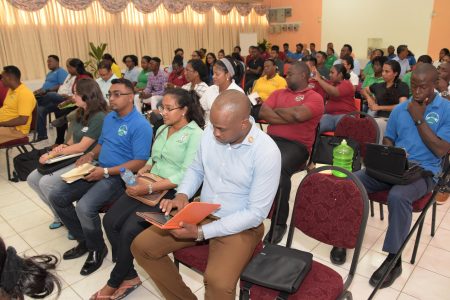Minister of State, Joe Harmon on Tuesday called on the Environmental Protection Agency (EPA) to place greater focus on concrete research to guide environmental management in new and developing sectors such as oil and gas.
The Minister said that emphasis should also be placed on technical expertise and environmental management as he noted that mechanisms to promote the implementation of low impact methods, technology and infrastructure and to address or monitor transboundary movement of pollutants are necessary, according to a press release from the Ministry of the Presidency (MotP). The Minister, who holds responsibility for the Department of Environment (DOE) under which the EPA falls, was at the time delivering the feature address at the EPA’s Staff Retreat and Capacity Building Workshop at the Mainstay Resort.

“Some of the positions taken by Government are challenged by some local experts and they are also challenged internationally. So you will find them challenging the technical competence of the EPA in the decisions that they make so that when you make a determination, we have to be satisfied that the technical basis of that determination is sound and that we can defend it anywhere in the world. That is why it is very important that we develop technically defensible positions in what we do. Also, your plans should not only be geared toward execution but also to the development of mechanisms to strengthen and (an) enabling framework for execution,” Harmon was quoted as saying in the MotP release.
Harmon noted that through this process, ideas for policy, legislative, institutional and procedural reforms should be generated and not only for the EPA but also for the related sectors, according to the MotP release.
“What I am saying is that the processes and the policies, which you generate must not only be seen as regulating internally, the EPA mechanisms, but the other sectors that are required to do things, which impact on the environment must also determine the way they act. So it is important for you to have very clear, very strong policies, which are defensible and is defensible because it is technically sound and we have competent people who are actually doing that,” Harmon was quoted as saying in the MotP release.
According to the MotP release, Harmon noted that as an agency under the DOE, the EPA’s role is central to guiding Government, private sector and civil society towards striking a balance between the exploitation of the nation’s natural resources and environmental stewardship, thus the execution of the functions of the agency to ensure conservation protection and sustainable use of Guyana’s natural resources and the established, managed and enforced environmental regulations are key elements in pursuing sustainable development.
In this regard, according to the MotP release, Harmon commended the agency for its recent restructuring programme, where the organisational structure has been amended to target and address through separate programme areas, all aspects of environmental management. It is part of strategic planning, he said, which is needed to take the agency forward.
“I see and have been informed that these will include waste management, ecological and human health risk assessment, lands and terrestrial resource management, environmental analysis service, air quality management, water quality resource management, biological, coastal and marine resource management, and environmental communication and education and awareness. This restructuring was needed and was very timely and by this, you have established the framework for the development of a strategic plan for the agency, which I see as the main focus of your retreat. Your strategic plan must be one, which generates targets, clear timelines and annual work plans that guide the implementation of work within the EPA,” Harmon was quoted as saying in the Motp release.
Dr. Patrick Williams, Chairman of the Board of the EPA, in his remarks, according to the MotP release, said that it is his hope that the Agency will now recognise that it cannot be business as usual and the EPA must now adapt and change it approaches.
“We have a responsibility to current and future generations and we must be able to bequeath to our future generations, not just things that make them happy but which can improve their lives and livelihoods. The EPA has that responsibility,” Dr. Williams was quoted in the release as saying.





